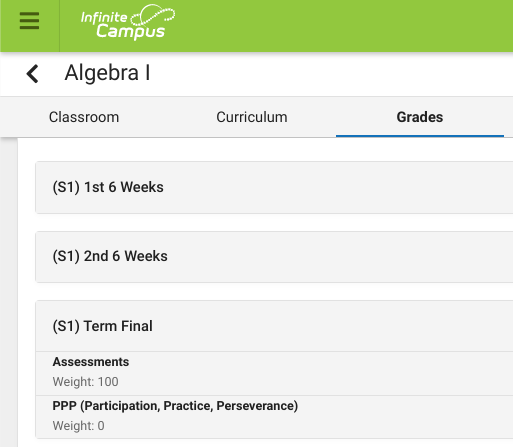Does Arvada West’s system for grading mathematics need to change (again)?

Assessments make up the entirety of every students’ grade in the math department
If you’ve ever been in an A-West mathematics class, you know that the math department’s way of grading is a little different from the rest of the school.
Most students don’t think too much about how they are graded; the main focus is what grade they end up receiving. This is why it can come as a surprise when students realize that in the math wing, most of their class work, deemed “practice” or “participation,” counts for zero percent of their overall grade.
That’s right; standards based grading, a system where assessments and tests make up 100% of every A-West student’s math grade, is in place all throughout the math department. This can have a big impact on one’s grade, both in a positive and negative way.
The main question with standards based grading is if students are really going to have the motivation to do work that does nothing for their grade. Well, there are multiple ways to look at it.
On one hand, the work does actually affect the student’s grade, just not directly. By studying and practicing through classwork, students are able to positively affect their grade by preparing themselves for assessments, which make up their entire grade.
However, a good deal of students view this system in a more cynical light. The common sentiment is that math classwork does nothing for a student’s grade, and in return offers little to no motivation to complete work. This can negatively impact a student’s grade, as students who don’t do classwork aren’t as prepared for tests, get lower scores, and as a result get worse grades.
Declan Simington, an A-West freshman, is not in favor of this system, as “It makes you not want to do the work because you get no grade on it so why would you do it? And then you do worse on the test which makes you fail.”
However, lack of motivation isn’t the only issue with standards based grading. For students who struggle with test taking or have test anxiety, having their whole grade reliant on assessments can be hard.
In fact, according to the University of North Carolina, “Many students experience varying levels of test anxiety,” which means that this proven medical condition is actually fairly common among students. Therefore, a percentage of the student body is not performing at their best on assessments, which in turn results in them not receiving the grade they deserve.

With some of the problems surrounding standards based grading in the math department, many students would consider change a viable option.
However, there are two sides to every story.
Allison Campe, an Algebra 1 and Inferential Probability and Statistics teacher, likes the grading system, sharing “I think overall it’s really great because every student is different; every student needs a different amount of practice, so when we think about what a grade should represent in a class it should really represent the knowledge of the content.”
Additionally, Kimberly Mizenko, an AP Statistics and Pre-AP Geometry teacher, shares “I was nervous about it at first but after a semester of doing it I really like it.” She adds “I have similar amounts of students who are doing homework, maybe a little more than before, but they are doing homework for the right reasons.”
While the math grading system is going to be around at least until the end of the current school year, there is always the possibility of change. With that being said, the positives may outweigh the negatives, but the opposite applies as well. Most importantly, does Arvada West’s system for grading mathematics need to change (again)?

Madeus Frandina is a Junior at A-West who loves anything involving literature and plays soccer. He is a huge Liverpool FC and Carolina Panthers fan, and...


